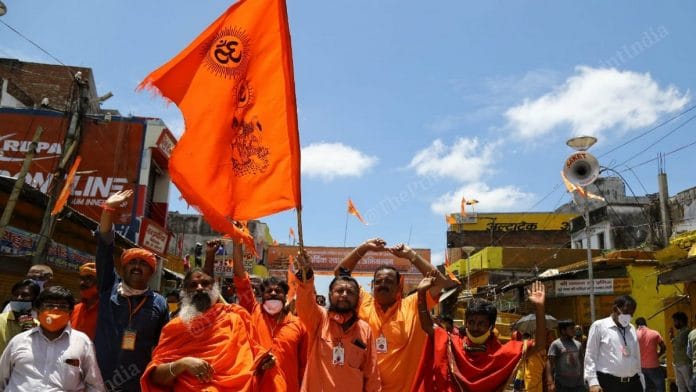Dismantling Global Hindutva was a three-day online conference to discuss the factors behind the rise of the Hindu nationalist movement and its impact on the world. As they always do, people picked their sides without much ado in favour or against this seminar. Some called it a Left-leaning Communist conspiracy against Bharat, others said this will certainly help people understand the psyche of Saffron terror and how it operates across political boundaries in India.
I have to say that the conference successfully dealt with the question of how Hindutva-like credo has managed to sustain caste oppression and male chauvinism (patriarchy) for hundreds of years. Unfortunately, that is still part and parcel of Indian society even after 75 years of its Independence. The Centre-Left within me also concurs with their analogy comparing Global Hindutva and the ideology of National Socialism, as both works to achieve the singular agenda of establishing Brahmins and Aryans at the top of institutional and social pyramid.
But according to my personal observation, I’ve found five problematic issues with the event that I can’t agree with.
- Declaring Hinduphobia as a myth
The scholars who participated in the event have done a great disservice to the millions of Hindu minorities living in Pakistan, Bangladesh and other Islamic and even Western countries by announcing Hinduphobia as a made-term by far-Right extremists. It might be true to some extent, but how can they forget the state of Hindu minorities in the world who are subject to the worst systemic oppression, forcible conversion and are treated as second-class citizens in neighbouring countries. Their places of worship are destroyed and, in multiple instances, blasphemy laws have been used to target religious minorities for speaking out against the torture and persecution they face in daily life.
1. Dismantling Hinduism in the name of Hindutva
One of the speakers at DGH, Akanksha Mehta, who is a director of the Centre for Feminist Research at Goldsmiths in London, argued, “I emphasise, without hesitation, that Hindutva is inseparable from Hinduism. And arguments that Hindutva is not Hinduism is deeply dangerous and will not lead us to the future we want.”
Islamophobe bigots apply the same logic to draw a parallel between Wahhabism (Islamist Extremism) and Islam (a religion) to prove their point that there’s something faulty in the religion that inspire Muslims to become jihadi fighters.
The crux of the matter is that humans have committed atrocities in the name of religion and that’s why religious renaissance is the need of the hour. Questions must be asked to all priests, pundits, mullahs and other religious leaders: What are they doing to counter fundamentalism and zealotry that is responsible for human suffering?
Also read: The gains of Dismantling Global Hindutva conference will help reclaim Hinduism
2. Uncalled for comparison between Taliban and Sangh Parivar
To all the scholars and academics who have made comparisons between the RSS and Taliban, you are not adding anything new to the liberal discourse. Left-liberals have contributed immensely to literature, philosophy and in the birth of new revolutionary ideas in the past, but today, they are losing their acumen due to ideological bankruptcy. Now it feels juvenile to compare everything from the Right with Italian Fascism or German Nazism, or now with the Taliban. Many have raised genuine apprehension if socialists are really capable of pushing back against the Right-wing authoritarian government in India. The Sangh, on multiple occasions, has spewed venom against religious minorities and it also acts as an ideological inspiration for the BJP. But now it’s high time for us (Left-liberals) to do away with the “comparison business” or at least make it more rational.
3. Failed to suggest any practical solution
The DGH conference focused more on talking about an already existing problem instead of offering pragmatic suggestions on how to Dismantle Hindutva. It would have made more sense if the organisers of the event organised a special session on how to limit the influence of Right-wing extremism. For instance, the speakers could have discussed ways to raise awareness among voters about the effect of communalism in hampering social and economic development. Similarly, questions might be asked about what can be done to bring a behavioural change in electorates so that they cast votes while keeping in mind their personal grievances and problems that directly affect them rather than relying on issues like national defence, Mars mission.
4. Elitist and non-inclusive
We could see the resemblance of Lutyens’ Darbar in the DGH conference where privileged UC savarnas were delivering their sermons to the English-speaking janta having no foot on the ground. There was just a handpicked number of Dalits, Bahujans and people from minority communities invited to the conference as guest speakers. The online seminar was dominated by Mehtas, Dixits, and Subramaniams. It felt like “Brahmins bashing other Brahmins” for the sake of debate, having no interest in improving ground realities.
If we are serious about influencing people who are at the receiving end of the social structure, it’s important to increase the participation of people from that community. Hindutva favours the marginalisation of the oppressed to maintain caste hierarchy in society and to dismantle this ideology, we need to regularly communicate with the people who are most affected by it in their regional language, via the medium they can easily access.
Ajit Singh is a student at St. Aloysius College, Jabalpur. Views are personal.






